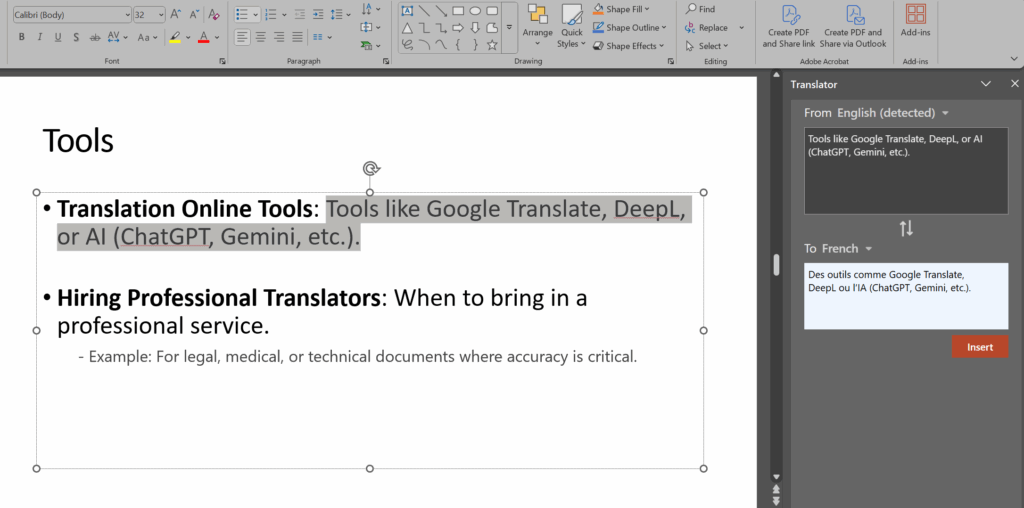
Discover essential strategies for selecting the ideal eLearning translation company tailored to your organization’s needs, addressing key factors in navigating global educational landscapes.
In our increasingly interconnected world, where knowledge knows no borders, eLearning has become a cornerstone of education and professional development. As instructional designers and eLearning developers, we’re no strangers to the challenges of creating engaging and effective online learning experiences. But what happens when our carefully crafted content needs to reach learners around the globe?
That’s where eLearning translation companies swoop in to save the day. In this blog, we’ll explore the vital role these companies play in today’s globalized landscape and provide a comprehensive guide to help you choose the right one for your needs.
Topics covered in this article:
- Understanding Your Learning Translation Needs
- Factors to Look For When Choosing an eLearning Translation Vendor
- Key Questions to Ask Potential eLearning Translation Vendors
- Tips for Making the Right Choice
Understanding Your Learning Translation Needs
Picture this: You’ve spent countless hours crafting the perfect eLearning module, only to realize it needs to be translated into multiple languages. Before diving into the sea of eLearning translation companies, it’s essential to understand your specific translation requirements.
Do you need translations for compliance training, software simulations or videos? Are you targeting a specific demographic or region? Whatever your translation needs may be, it’s crucial to find a vendor that speaks your language—both literally and figuratively.
Consider the technical aspects as well. Does the translation company have experience with your authoring platform? Can they handle multimedia elements like videos and interactive content? These questions are crucial for seamless integration and a smooth localization process.
Establish your non-negotiables of what you need your translation service to provide. This will help immediately eliminate companies that won’t meet your needs.
Factors to Look For When Choosing an eLearning Translation Vendor
When trying to determine what your translation needs are, consider these factors. You may want your translation vendor to check every box or just a few – but these are the common considerations we see eLearning course developers seeking in a translation agency.
- Language Expertise and Translation Experience
- Demonstrated Experience: When choosing eLearning translation providers, experience is key. Look for a company with a proven track record in eLearning translation and localization. They should be able to showcase their experience through a portfolio of successful projects in the field. Bonus points if they can provide client references or sample projects at the drop of a hat.
- Instructional Design Knowledge: Understanding instructional design principles and learning methodologies is crucial for effectively adapting eLearning content. Ensure the translation company has expertise in this area to deliver engaging and impactful learning experiences.
- Industry Standards and Regulations: Knowledge of industry-specific standards such as SCORM, AICC, and ADA Section 508 compliance is essential for ensuring the compatibility and accessibility of eLearning content across different platforms and devices.
- LMS Experience: Experience with Learning Management Systems (LMS) is valuable as it facilitates seamless integration and deployment of translated content within your existing eLearning infrastructure.
- Linguistic and Cultural Competence:
- Native-Speaking Translators: Seek out translation companies that employ native-speaking translators with proficiency in the target language(s). Native speakers are better equipped to capture nuances and cultural subtleties, resulting in more authentic and relatable translations.
- Cultural Nuances: In the realm of eLearning translation vendors, cultural sensitivity is paramount! Ensure the translators are familiar with cultural and regional variations, dialects, and idiomatic expressions. They should be to adapt content to resonate with diverse audiences worldwide.
- Certified Processes: Look for companies that follow certified processes for linguistic and cultural adaptation, ensuring accuracy and authenticity in translations. For example, Interpro holds ISO certifications for Quality and Translation and offers certified translations. This means we’ve demonstrated consistently delivering accurate translations and great customer service.
- Subject Matter Specialization:
- Diverse Content Types: Look for a vendor with the ability to handle diverse content types, from technical manuals to job aids and medical documentation.
- Industry-Specific Terminology: Every industry has its own jargon and terminology. Choose a translation company that specializes in your field, whether it’s healthcare, manufacturing, or technology.
- Access to SMEs: Ensure the company has access to subject matter experts or specialized linguists with expertise in relevant fields. This is crucial for accurate and contextually appropriate translations.
- Localization Tools and Technologies:
- Advanced Localization Tools: Utilization of advanced localization tools and software platforms streamlines translation workflows and ensures consistency across projects. Look for companies that leverage technology to enhance efficiency and quality.
- Integration with CAT Tools: Integration with Computer-Assisted Translation (CAT) tools for terminology management, translation memory, and glossary management improves translation accuracy and consistency.
- Multimedia Localization Support: Ensure the company can handle multimedia localization, including video subtitling, voiceover recording, and graphic adaptation, to provide a seamless learning experience across different cultural contexts.
- File Type Support: Not all translation agencies accommodate every file type, and certain file types may not support all languages, particularly right-to-left languages like Arabic. Choose an eLearning translation company experienced in managing these challenges for optimal results.
- Quality Assurance Processes:
- Robust QA Processes: Quality should never be compromised in translation. Ensure the company has robust Quality Assurance (QA) processes in place, including linguistic validation, terminology consistency checks, and dedicated QA teams.
- ISO Quality Standards: Compliance with ISO quality standards, such as ISO 17100:2015 for translation services, is a good indicator of the eLearning translation company’s commitment to delivering high-quality translations.
- Non-Disclosure Agreement: Protect your sensitive information and ensure confidentiality throughout the translation process. An NDA will help maintain trust and security while handling proprietary or confidential content.
- Project Management and Communication Capabilities:
- Dedicated Project Managers: Project managers are the unsung heroes of eLearning translation providers, guiding you through the maze of translation timelines and deliverables. Look for companies with dedicated project managers who can serve as your single point of contact, overseeing project timelines and deliverables.
- Transparent Communication: Transparent communication channels and regular progress updates are essential for keeping you and your stakeholders informed and ensuring project success.
- Collaboration Tools: Collaboration tools and platforms facilitate efficient file sharing, version control, and feedback management among project stakeholders, enhancing productivity and collaboration.
- Scalability:
- Flexibility: Choose a company that can accommodate projects of varying sizes and complexities, from small-scale modules to enterprise-level eLearning curricula. Flexibility ensures that the company can scale operations to meet your evolving needs.
- Infrastructure and Resources: As your eLearning needs grow, so should your translation partner. Ensure the company has the infrastructure and resources to scale operations rapidly to meet tight deadlines or sudden increases in project volume, without compromising quality or turnaround time.
- Cost Considerations
- Pricing Translations: Cost to translate varies depending on factors like project complexity, language pairings, and inclusion of additional services. Ask for transparent pricing models and consider factors like per-word rates, hourly rates, and volume discounts. Remember, while cost is important, quality should never be compromised.
- AI translation services: If you have the flexibility and are working with a trusted vendor, you may consider AI translation services or Machine Translation Post-Editing to help reduce costs.
Key Questions to Ask Potential eLearning Translation Vendors
When venturing forth into the realm of eLearning translation vendors, arm yourself with the following questions:
- What is your experience with eLearning translation projects?
- What file formats can you handle?
- How do you ensure linguistic and cultural accuracy in translations?
- What technology and tools do you use for translation?
- Walk us through your quality assurance processes.
- How do you manage projects and communicate with clients?
- May we speak with some of your client references or localized courses that have ventured down a similar path?
Tips for Making the Right Choice
Choosing the ideal eLearning translation provider may seem daunting, but fear not! With a bit of savvy and a dash of luck, you’ll find the perfect match with these steps
- Conduct thorough research.
- Ask the right questions.
- Request customized quotes and samples.
- Seek clarification on any doubts or concerns you may have.
Bonus Step: Book a complimentary localization consultation with our experts. Submit questions about your localization project and our team will bring the professionals to ensure you walk away from our meeting with answers – no financial commitment required.
The quest may be long and arduous, but the rewards are well worth the journey. By understanding your needs, evaluating key factors, and asking the right questions, you can make an informed decision that sets you up for success. Remember, quality, expertise, and communication are the pillars of a successful partnership.
Category: Translation
Tags: Guides
Service: eLearning Translation
Industry: Learning and Development
Don't forget to share this post!
Stay Updated with Interpro
Subscribe to our newsletter for the latest updates and insights in translation and localization.







